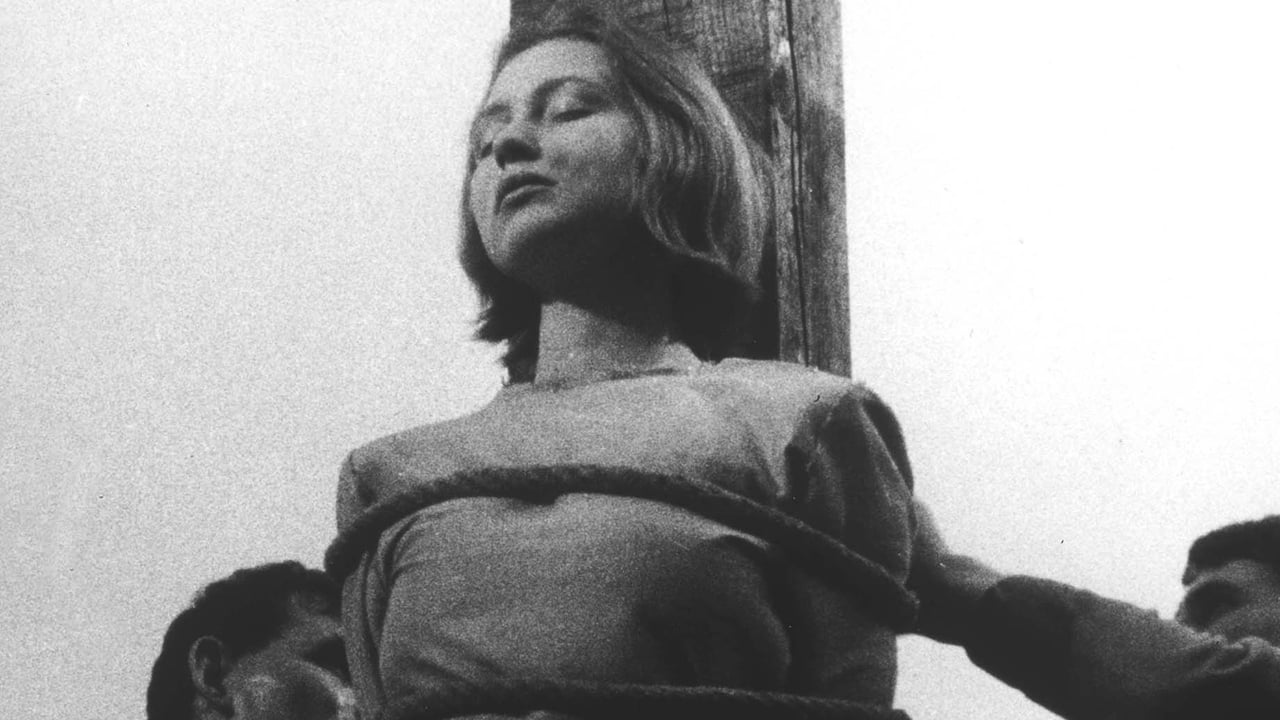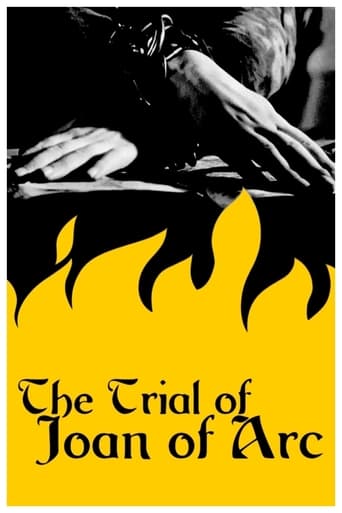



Not even bad in a good way
Fantastic!
This is a dark and sometimes deeply uncomfortable drama
View MoreThere are moments that feel comical, some horrific, and some downright inspiring but the tonal shifts hardly matter as the end results come to a film that's perfect for this time.
View MoreThis is the one Bresson allegedly made in response to Dreyer, though not sure if that was the real impetus or something said along the way to mark intentions. I can see how the project would appeal greatly to him; like his three previous ones, it's about an idealistic youth faced with a world that stifles the spirit. He must have felt it so apt that he could use actual transcripts of the trial kept by the notaries at Rouen.He films the trial as a process of facts, no flourish allowed anywhere, sparse and all the other things you'll read in comments, and all this as asceticism that purifies the eye, or so it goes. Dreyer's Joan was assailed by passions so overwhelming they escaped the body to rend the cinematic air. Huge contrast with Bresson's who is stoic and dispassionate, the air is static, everything is kept in body.One specific impetus behind the project I believe may hav been how to have the portrait of this woman, induce as much deliberate poverty of expression, and still give us a soul? He does it I think. He gives us a Joan who is indomitable, but also afraid, proud without losing her sweetness, glimmers of unsure innocence through the armor of god. He's gifted with a woman as marvelous as Dreyer had.It was an ongoing project for Bresson that stretched back several films, he surpasses them here in complete austerity. He was probably a happy camper looking back.But more than any individual film, it's his philosophy of purity that I feel is worth examining, and I'm in the middle of a few posts where I grapple with it. He was writing along the way a book that delineates this philosophy. It was seeing quotes from this book for years that prompted me to follow up on the films, it was something I've always had in the back of my mind tied to personal observations about emptiness and purity. I won't have conclusions before Balthazar, which is next in line, and probably the one after, but there is something to say here.We say that Bresson is pure, but if you look up close, there's a method. It's one of timing and blocking exact pieces, this extends from the camera to the actors, who become pieces to be moved. What he's doing is that he's taking the language of film and breaking it down to the most basic grammar. I see this as both an intellectually barren project to pick, why all your work will just be simplifying, and it sets you down a slippery slope where the only thing purer is is simple.Bresson makes a lot out of the importance of stillness, but at the center I perceive another notion; he writes that he wants nothing false, nothing that the eye doesn't see. It's a grammarian's insistence on what is true, or seems so at this point, a dogmatist's claim on reality. How about all that we don't see but can feel move through us? He deliberately mutes this in the actors.And in the film we have what? A young girl who is full of inner things she feels, god or madness it's the same courage for her, faced with a cadre of clerics who set out to disprove it all as impure, the devil's work. What's happening during the trial is that these dogmatists are trying to corner Joan into saying that she saw what the eye doesn't see, the abstract in the world of senses, which is what Bresson is working against.(From a Christian view, it would be heretic to say that the divine was bound thus and so, and you were privy of that form)Were the saints clothed? Did St. Catherine have her hair down?Grammarians of spirituality. Now the task is open. More interesting than the actual films for me is this battle in Bresson, between the grammarian of spirituality with his fixed notions on the divine and Joan who wants to preserve the truth of what she felt. Is the world full of presence? Balthazar is up next.
View MoreFrench screenwriter and director Robert Bresson's sixth feature film which he wrote, is based on the transcripts of the trial of Joan of Arc also known as The Maid of Orléans. It premiered In competition at the 15th Cannes International Film Festival in 1962, was screened at the first New York Film Festival in 1963 and is a French production which was produced by producer Agnés Delahaie. It tells the story about Jeanne d'Arc, a nineteen-year-old peasant who in the spring of 1929 led the Dauphin of France's armies through several military victories which effected the Hundred Years War. Jeanne claimed that she on numerous occasions received guidance from God and other saints, but in December 1431 she was accused of heresy and placed on trial at a church court in Rouen, Northern France before Pierre Cauchon, the Bishop of Beauvais. Distinctly and acutely directed by French filmmaker Robert Bresson (1901/1907-1999), this finely tuned and scrutinizing reconstruction of an historical event which is narrated mostly from the protagonist's point of view, draws an incisive portrayal of the inquisition of a young woman. While notable for it's naturalistic milieu depictions, fine art direction by French production designer and art director Pierre Charbonnier, black-and-white cinematography by French cinematographer Léonce-Henri Burel (1892-1977) and use of sound, this dialog-driven drama contains an efficient score by composer Francis Seyrig. This humane, consistently involving and biographical study of character from the early 1960s which is set in the capital of Upper Normandy in France in the 15th century, is impelled and reinforced by it's stringent narrative structure, constrained dialog, substantial character development and the prominent acting performances by French actress and screenwriter Florence Delay and French painter Jean-Claude Forneau (1907-1981). An atmospheric, conversational and unsentimental chamber piece which gained the Special Jury Prize and the OCIC Award at the 15th Cannes Film Festival in 1962.
View MoreThis is a magnificent rendition of the trial of Joan of Arc (Florence Delay in his only acting); as after the successful liberation of Orléans and Reims , the Dauphin can be crowned traditionally in the cathedral of Reims - and does not need her anymore, since his wishes are satisfied. The uncrowned King Charles VII sent her to the siege of Orléans as part of a relief mission . Jeanne d'Arc gets set up in his trap and is imprisoned by the Burgundians. In a trial (presided by bishop Cauchon well played by Fournier) against her under English law, she can't be forced to tell about her divine visions she has had continuously since childhood. Being condemned of witchcraft and being considered as relapsed heretic, she is sentenced to death . Jeanne d'Arc is burnt alive in the marketplace of Rouen on May 30th, 1431, at only 19 years of age .This excellent film by Robert Bresson was based entirely on the transcripts of the real-life trial , adapted in theatrical fashion ; concerning Joan's imprisonment, interrogation and final execution at the hands of the English . Joan excellently played by Florence Delay asserted that she had visions from God , Saint Catalina , Saint Margarita and Angel St Michelle that instructed her to recover her homeland from English domination late in the Hundred Years' War. Although the story takes place in 1431, Jeanne's hairstyle is strictly a popular mode of the early 1960s. This is not a "goof" but an intention on the director's part to help young people identify with the character. It was shot in a spare , too serious and low-key style . Runtime movie is short , approx. 65 minutes , but is neither boring , nor dull but thought-provoking . The ending scenes in which she's condemned is very interesting and the sentence at the burning pole is overwhelming .Other films about this historic character are the following : TV version (1999) with Lelee Sobieski , Neal Patrick Harris as Charles VII , Peter O'Toole as the Bishop , Powers Boothe , Olimpia Dukakis and Peter Strauss ; Joan of Arc (1999) by Luc Besson with Milla Jovovich , Tchéky Karyo as Dunois , John Malkovich as Charles VII and Toby Jones ; Saint Joan (1957) by Otto Preminger with Jean Seberg , Richard Widmark , Richard Todd and John Gielgud ; Joan of Arc (1954) by Roberto Rosselini with Ingrid Bergman ; Joan of Arc by Victor Fleming (1948) with Ingrid Berman , J Carrol Naish , War Bond and Jose Ferrer as Charles VII . Furthermore , silent adaptation such as the classical La passion de Jeanne d'Arc (1928) by Carl Theodor Dreyer with Maria Falconetti and Joan The woman (1916) by Cecil B Demille .The movie was set in ¨Hundred years war¨ developed between 1337 and 1453 (downfall date of Constantinopla by Turks). The historical deeds are the following : Henry V vanquishes Charles VI in Agincourt (1415) that was a major English victory against a numerically superior French army in the Hundred Years' War . The battle occurred on Friday, 25 October 1415 and Henry V takes over on Normandy . Charles VI of France signs ¨Troyes treatise¨ in which Henry V is wedded to Charles's daughter . Later on , Henry VI of England proclaims himself king of France but then Joan of Arc proclaims in Bourges to Charles VII as king , after being crowned in Reims . She gained prominence when she overcame the dismissive attitude of veteran commanders and lifted the siege in only nine days. Joan of Arc acting as a divine mission defeats English army in Orleans .Several more swift victories led to Charles VII's coronation and settled the disputed succession to the throne . But she's captured by the Burgundians and is handed over to English authorities and they fire her for heretic and witch in Rouen.
View MoreDiffidence is the watchword of Robert Bresson's insanely brassy reexamination of the transcripts of Joan's trial--material you might have thought amply covered by Carl Dreyer's PASSION OF JOAN OF ARC. It's diffidence that makes it impossible to tell whether the movie is meant as an ascetically pure, un-underlined hagiographic manuscript, or the case study of a sociopath, or a cool indictment of the cogs of theocratic power a la Aldous Huxley's THE DEVILS OF LOUDUN. Bresson's only philosophy here seems to be a life-or-death commitment to the noncommunicative.
View More